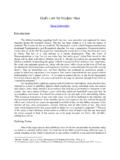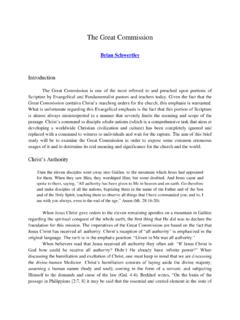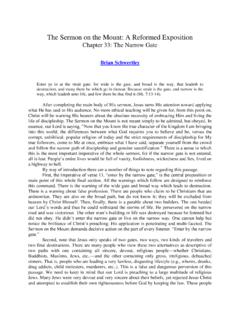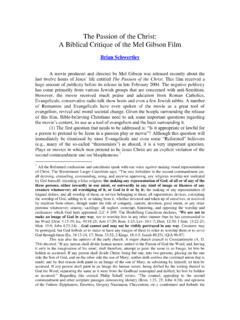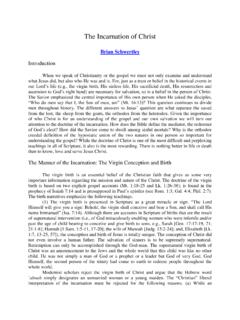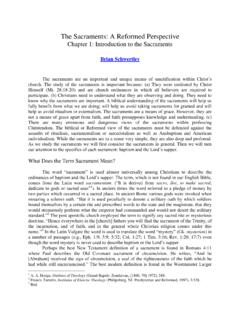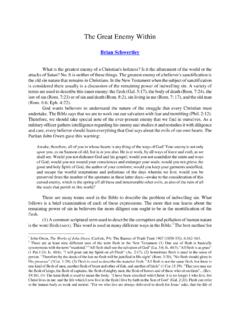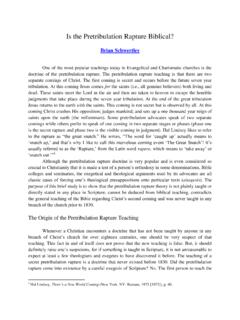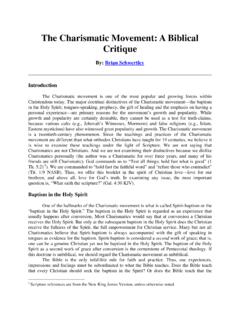Transcription of Exclusive Psalmody: A Biblical Defense
1 Exclusive psalmody : A Biblical Defense Brian Schwertley Introduction One of the most (if not the most) important activities that believers engage in is the worship of the thrice holy, triune God of Scripture. While all Christians agree as to the importance of worship, there is not agreement as to the content of worship. Some churches sing hymns of merely human composition; some churches sing uninspired hymns and inspired songs from the Biblical Psalter, while some churches sing only from the 150 Psalms of the Bible. Using the book of Psalms alone as the manual of praise in the church is referred to as Exclusive psalmody . Today Exclusive psalmody is so rare among churches that many people have never heard of it or encountered it.
2 When some people do encounter it, they often think it is odd, antiquated, and dull. What most Christians do not know is that at one time most churches practiced Exclusive psalmody . During the sixteenth, seventeenth, and most of the eighteenth centuries, the book of Psalms was used as the only manual of praise in Reformed and Presbyterian churches. The purpose of this study is to show from Scripture that Reformed worship, or Exclusive psalmody , is not just a bizarre tradition inherited from Calvin or Knox, but is the teaching of God s holy This is necessary, for due to our Church s long continued practice of the apostolic and reformed mode of worship, there is persistent danger that people outside our Church will regard our worship as simply the perpetuation of an ancient tradition, and as not broad-based on Scripture.
3 2 It is our earnest prayer that this little book will be used of God to bring many of our Reformed and non-Reformed brethren back to the purity of worship attained by the Calvinist wing of the Reformation. Chapter 1: The Scriptural Law of Worship There are a number of important doctrines in the Bible which are deduced from many parts of Scripture and cannot be conclusively proven from one or two verses. Exclusive Psalm singing is one such doctrine. Exclusive psalmody flows directly from the overall teaching of Scripture regarding the worship of Jehovah. The Bible teaches that the acceptable way of worshipping the true God is instituted by Himself, and so limited by His own revealed will, that 1 This short treatise on Exclusive psalmody contains nothing new or original.
4 In fact, the author would prefer that everyone purchase a copy of Michael Bushell s The Songs of Zion (Available from Crown and Covenant Publications, 800 Wood St., Pittsburgh, PA 15221) and read it carefully. But, because we have found few believers willing to read a long scholarly treatise such as Bushell s, we have organized many of the arguments for Exclusive psalmody together in a small booklet. 2 Ramsey, Psalms Only: Objections Answered (Presbyterian Church of Eastern Australia, 1971), p. 3. He may not be worshipped according to the imaginations and devices of men, or the suggestions of Satan, under any visible representation, or any other way not prescribed in holy Scripture.
5 3 When it comes to the elements of worship and the content of praise, we must have a warrant from God s word. God sets the parameters on what is permissible in worship, not man. In other words, anything that the church does in worship must be proved from the Bible. This proof can be attained by an explicit command of God ( , Do this in remembrance of Me, Lk. 22:19); or by logical inference from Scripture ( , there may not be an explicit command, but when several passages are compared, they teach or infer a scriptural practice); or by Biblical historical example ( , the change from the seventh day to the first day of the week for corporate public worship). The Reformed doctrine of worship called the scriptural law of worship ; the puritan principle of worship ; or, the regulative principle of worship is clearly taught in both the Old and New In Genesis 4:3-5 we read that God rejected Cain s offering of the fruit of the ground, but accepted Abel s offering of animal sacrifices.
6 Why? Because even though offering fruit is not prohibited, it also was not commanded. Leviticus 10:1-2 records that God killed Nadab and Abihu because they offered strange fire, which God commanded them not. The offering of strange fire is not prohibited in Scripture, but it also is not commanded. In Deuteronomy 12:32, in the specific context of avoiding false heathen worship practices, God said, Whatever I command you, be careful to observe it; you shall not add to it nor take away from it (cf. Dt. 4:2; Jer. 7:24,31; 19:5; I Kgs. 12:32-33; Num. 15:39-40). In 2 Samuel 6:3-7 we read of God s judgment on David s men who were moving the ark. Why were they judged? God was angry because they did not follow the due Moses commanded according to the word of the Lord (1 Chr.)
7 15:13-15). Jesus chided the Pharisees for adding to God s law: Why do you also transgress the commandment of God because of your tradition? (Mt. 15:3). Jesus told the women at the well that they that worship Him [God] must worship Him in spirit and in truth (Jn. 4:24). When Jesus Christ gave orders to the apostles before His ascension into heaven, did He give the church the authority to make up their own doctrine, government, worship, and holy days? Absolutely not! He said to teach them [the nations] to observe all things that I have commanded you (Mt. 28:20). Jesus told the Pharisees who made up their own rules regarding worship, In vain they do worship Me, teaching for doctrines the commandments of men (Mt.
8 15:9). Paul says that adding the commandments and doctrines of men to Christianity is self 3 The Westminster Confession of Faith, Chap XXI:1. It was the application of this principle which enabled the Protestant Reformers to accomplish their great work of reformation. They denied for example the validity of five of the seven sacraments of the corrupt Church, and retained only Baptism and the Lord s Supper. Likewise the application of this principle enabled them to purify the worship of God by ordering it in accordance with God s will as set forth in His Word. Thus the work of the Reformation had its positive and negative aspects.
9 It involved the rejection of the use of altars, crosses, crucifixes, candles, incense, and a host of other unscriptural practices, as well as the reinstatement of free prayer as distinct from set forms of prayer, the reading and exposition of God s word, and the congregational singing of the Psalms. Where this principle that what is not prescribed is forbidden is rejected or ignored, purity of worship is imperiled ( Ramsey, Psalms Only, pp. 24-25). 4 For more on the Regulative Principle of worship see: B. Schwertley s Musical Instruments in the Public Worship of God, Chapter One; also, Sola Scriptura and the Regulative Principle of Worship, chapters 4 and 5. imposed religion, false humility and is of no value against the indulgence of the flesh (Col.)
10 2:20-23). The Biblical teaching regarding worship is crystal clear. The church s job is not to innovate and create new worship forms or ordinances, but simply to see what God has declared in His word and obey it. The power of the church is purely ministerial and declarative. She is only to hold forth the doctrine, enforce the laws, and execute the government which Christ has given to her. She is to add nothing of her own to, and to subtract nothing from what her Lord has established. Discretionary power she does not possess. 5 John W. Keddie writes, The great Church historian William Cunningham pointed out that the implication of this [principle] if it were fully carried out, would just be to leave the Church in the condition in which it was left by the Apostles, in so far as we have any means of information a result, surely, which need not be very alarming, except to those who think that they themselves have very superior powers for improving and adorning the Church by their inventions [The Reformers and the Theology of the Reformation, p.]
